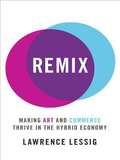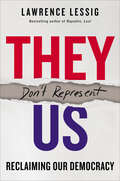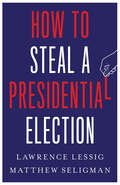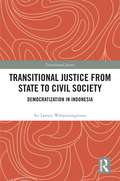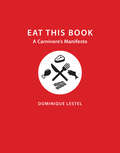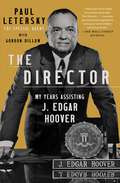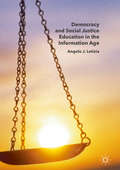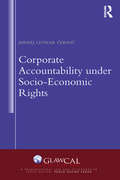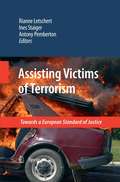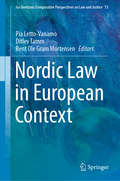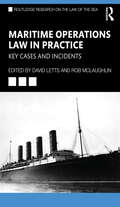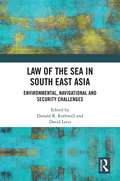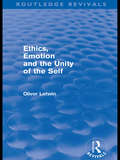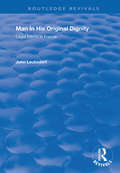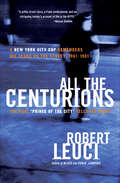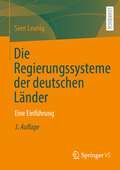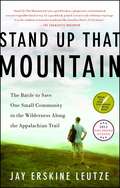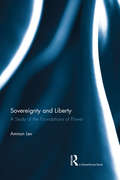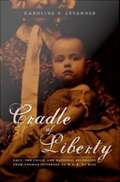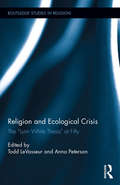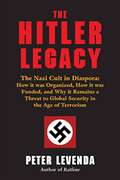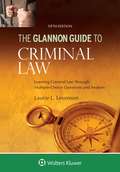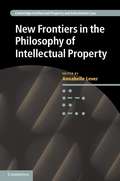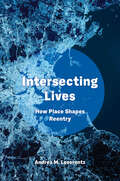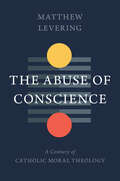- Table View
- List View
Remix
by Lawrence LessigThe reigning authority on intellectual property in the Internet age, Lawrence Lessig spotlights the newest and possibly the most harmful culture war?a war waged against those who create and consume art. America?s copyright laws have ceased to perform their original, beneficial role: protecting artists? creations while allowing them to build on previous creative works. In fact, our system now criminalizes those very actions. Remix is an urgent, eloquent plea to end a war that harms every intrepid, creative user of new technologies. It also offers an inspiring vision of the postwar world where enormous opportunities await those who view art as a resource to be shared openly rather than a commodity to be hoarded. .
They Don't Represent Us: Reclaiming Our Democracy
by Lawrence Lessig“An impassioned call to all Americans to fight for equal representation.” — Kirkus Reviews“This bracing report on the state of American politics offers valuable insights for the 2020 elections.” — Publishers Weekly“A thoughtful, illuminating, nonpartisan, and pragmatic analysis of the changes needed to restore power to the public… In this bold and compelling book, Lessig both scrutinizes the laws and forces that led us to this point and guides us towards visionary changes that can reset and restore our faith in our democracy. Given the complexities of the tasks at hand, this a must-read and a much-needed wake up call.” — Booklist“Lessig tells it with skill, citing a plethora of studies and historical examples to make a persuasive case about the unrepresentativeness of America’s political institutions.” — New York Time Book Review“Lessig paints a searing portrait of a defective political system that is nonetheless full of hope, community spirit, self-empowered individuals, and ways to fix what is broken.” — Foreign Affairs “Lessig is right that a representative American democracy, desirable in itself, would also solve most of the problems that now seem insoluble. It is hard to imagine a more thoughtful and appealing companion in the hard work to move our system to where it ought to be: in our own hands.” — Timothy Snyder, bestselling author of On Tyranny and The Road to Unfreedom“Lessig, a leading proponent of campaign finance reform, now aims at something even bigger: fixing our broken system of representative democracy. This book is brimming with promising and provocative proposals to fix campaign finance, gerrymandering, the electoral college, the filibuster, and the mind-numbing effects of cable news and social media. It is a bold and bracing repair manual for government of, by, and for the people.” — Michael J. Sandel, bestselling author of What Money Can’t Buy“Lessig is a modern-day Paul Revere with a warning we must heed: Our representative democracy no longer represents us. The change we need is deep and serious. And it can’t be fixed with by one election, party, or politician. This urgent book offers not only a clear-eyed explanation of the forces that broke our politics, but a thoughtful and, yes, patriotic vision of how we create a government that’s truly by and for the people. We ignore his alarm at our own peril.” — David Daley, bestselling author of Ratf**ked and Unrigged“Everything Lessig writes should be carefully read. Read it, consider it, and most important, act on it. Our democracy is at stake.” — Nancy MacLean, bestselling author of Democracy in Chains“The American experiment in representative government is on life support. In his brilliant book, Lessig provides the medical record and a recommended course of care to save the patient. Every American should read it ... stat!” — Roger McNamee bestselling author of Zucked“Full of original, provocative insights and surprising stories, this book is for all who seek to create effective democracy in America.” — Frances Moore Lappé, bestselling author of Diet for a Small Planet and coauthor with Adam Eichen of Daring Democracy“Lessig proposes the making of a nonpartisan politics to breathe life into the corpse of America’s dysfunctional democracy. He does so with fierce and plainspoken clarity. A challenging work of the political imagination, unsweetened with pious cant.” — Lewis H. Lapham, editor and founder of Lapham’s Quarterly“Lessig is the thinking man’s popular
How to Steal a Presidential Election
by Lawrence Lessig Matthew SeligmanFrom two distinguished experts on election law, an alarming look at how the American presidency could be stolen—by entirely legal means Even in the fast and loose world of the Trump White House, the idea that a couple thousand disorganized protestors storming the U.S. Capitol might actually prevent a presidential succession was farfetched. Yet perfectly legal ways of overturning election results actually do exist, and they would allow a political party to install its own candidate in place of the true winner. Lawrence Lessig and Matthew Seligman work through every option available for subverting a presumptively legitimate result—from vice-presidential intervention to election decertification and beyond. While many strategies would never pass constitutional muster, Lessig and Seligman explain how some might. They expose correctable weaknesses in the system, including one that could be corrected only by the Supreme Court. Any strategy aimed at hacking a presidential election is a threat to democracy. This book is a clarion call to shore up the insecure system for electing the president before American democracy is forever compromised.
Transitional Justice from State to Civil Society: Democratization in Indonesia
by Sri Lestari WahyuningroemThis book is the first to offer an in-depth analysis of transitional justice as an unfinished agenda in Indonesia’s democracy. Examining the implementation of transitional justice measures in post-authoritarian Indonesia, this book analyses the factors within the democratic transition that either facilitated or hindered the adoption and implementation of transitional justice measures. Furthermore, it contributes key insights from an extensive examination of ‘bottom-up’ approaches to transitional justice in Indonesia: through a range of case studies, civil society-led initiatives to truth-seeking and local reconciliation efforts. Based on extensive archival, legal and media research, as well as interviews with key actors in Indonesia’s democracy and human rights’ institutions, the book provides a significant contribution to current understandings of Indonesia’s democracy. Its analysis of the failure of state-centred transitional justice measures, and the role of civil society, also makes an important addition to comparative transitional justice studies. It will be of considerable interest to scholars and activists in the fields of Transitional Justice and Politics, as well as in Asian Studies.
Eat This Book: A Carnivore's Manifesto (Critical Perspectives on Animals: Theory, Culture, Science, and Law)
by Dominique LestelIf we want to improve the treatment of animals, Dominique Lestel argues, we must acknowledge our evolutionary impulse to eat them and we must expand our worldview to see how others consume meat ethically and sustainably. The position of vegans and vegetarians is unrealistic and exclusionary. Eat This Book calls at once for a renewed and vigorous defense of animal rights and a more open approach to meat eating that turns us into responsible carnivores. Lestel skillfully synthesizes Western philosophical views on the moral status of animals and holistic cosmologies that recognize human-animal reciprocity. He shows that the carnivore's position is more coherently ethical than vegetarianism, which isolates humans from the world by treating cruelty, violence, and conflicting interests as phenomena outside of life. Describing how meat eaters assume completely—which is to say, metabolically—their animal status, Lestel opens our eyes to the vital relation between carnivores and animals and carnivores' genuine appreciation of animals' life-sustaining flesh. He vehemently condemns factory farming and the terrible footprint of industrial meat eating. His goal is to recreate a kinship between humans and animals that reminds us of what it means to be tied to the world.
The Director: My Years Assisting J. Edgar Hoover
by Paul LeterskyThe first book ever written about FBI Director J. Edgar Hoover by a member of his personal staff—his former assistant, Paul Letersky—The Director offers unprecedented insight into an American legend.The 1960s and 1970s were arguably among America&’s most turbulent post-Civil War decades. While the Vietnam War continued seemingly without end, protests and riots ravaged most cities, the Kennedys and MLK were assassinated, and corruption found its way to the highest levels of politics, culminating in Watergate. In 1965, at the beginning of the chaos, twenty-two-year old Paul Letersky was assigned to assist the legendary FBI director J. Edgar Hoover who&’d just turned seventy and had, by then, led the Bureau for an incredible forty-one years. Hoover was a rare and complex man who walked confidently among the most powerful. His personal privacy was more tightly guarded than the secret &“files&” he carefully collected—and that were so feared by politicians and celebrities. Through Letersky&’s close working relationship with Hoover, and the trust and confidence he gained from Hoover&’s most loyal senior assistant, Helen Gandy, Paul became one of the few able to enter the Director&’s secretive—and sometimes perilous—world. Since Hoover&’s death half a century ago, millions of words have been written about the man and hundreds of hours of TV dramas and A-list Hollywood films produced. But until now, there has been virtually no account from someone who, for a period of years, spent hours with the Director on a daily basis. Balanced, honest, and keenly observed, The Director offers a unique inside look at one of the most powerful law enforcement figures in American history.
Democracy and Social Justice Education in the Information Age
by Angelo J. LetiziaThis book functions as a toolbox for preservice and veteran teachers, as well as teacher educators and professors who believe in and want to promote civic education in their classrooms. The book is comprised of eight methods. These methods focus on information location, evaluation and activation, dialogue in the classroom, understandings of discourse in popular culture and policymaking, understanding of the role of STEM disciplines in democracy, understandings of how the political process can provide meaning, new visions of justice in a globalized world, and student leadership and academic writing in the information age. All the methods call for students to create something, a paper, a project or an idea which can aid democracy. The book also outlines how teachers can evaluate these different creations.
Corporate Accountability under Socio-Economic Rights (Transnational Law and Governance)
by Jernej Letnar ČerničIn recent decades, corporations have increasingly accepted that they have obligations to respect the socio-economic rights of individuals whose rights to livelihoods, education, food, health, housing and water are affected by the actions of corporations on a daily basis. Despite this, it is often difficult for victims to bring corporations to court for violations of their socio-economic rights. Domestic constitutional systems provide, at best, fragile and limited protections against adverse corporate activities, while international responses have been lacking in creating obligations and accountability for corporations under socio-economic rights. The urgency of bolstering corporate accountability for socio-economic rights is therefore apparent. In light of this, this book asks whether corporations are required to observe socio-economic rights and if they are accountable for any violations. In doing so, it identifies and analyzes the theoretical foundations and the existing scope of corporate accountability arising from socio-economic rights at both national and international levels. Through careful analysis, Jernej Letnar Černič exposes the stark need for greater clarity in the obligations and accountability of corporations, advocating a normative framework for corporate accountability for socio-economic rights in national legal orders which builds on existing mechanisms.
Assisting Victims of Terrorism: Towards a European Standard of Justice
by Rianne Letschert Antony Pemberton Ines StaigerThe large-scale terrorist attacks on 9/11 resulted in more attention being devoted to victims of terrorist acts. Discussions took place on how their needs could be best accommodated. The Madrid bombings in March 2004 gave further impetus to this process. This development is also part of a recent trend towards general victim of crime policies that branch out into specialized policies devised to meet the needs of particular groups of victims such as victims of trafficking, victims of sexual violence and abuse or victims of traffic accidents. However, although a movement of national and international solidarity relating to addressing the needs of victims of terrorism has developed, political consensus is still fragile. This book provides a thorough analysis of the specific needs of victims of terrorism (using both legal and psycho-social studies), compared to victims of other forms of crime. The study combines different disciplines, enabling to combine the different perspectives leading to synergy in the analysis of the legal and psycho-social needs of victims of terrorism. Furthermore the appropriateness of restorative justice practices in the context of terrorism is included and provides challenging new insights.
Nordic Law in European Context (Ius Gentium: Comparative Perspectives on Law and Justice #73)
by Pia Letto-Vanamo Ditlev Tamm Bent Ole Gram MortensenNordic law is often referred to as something different from other legal systems. At the same time, it is a common belief that the Nordic countries share more or less the same legal tradition and are very similar in their approach to the law. Considering both of these points of view, the book tells a story of how Nordic law and Nordic legal thinking differ from other legal systems, and how there are many particularities in the law of each of the Nordic countries, making them different from each other.The idea of “Nordic” law also conceals national features. The basic premise of the book is that even if, strictly speaking, there is no such thing as a Nordic common law, it still makes sense to speak of “Nordic” law, and that acquiring a more-than-basic knowledge of this law is interesting not only for comparative lawyers, but also helpful for those working with Nordic lawyers and dealing with questions involving law in the Nordic countries.
Maritime Operations Law in Practice: Key Cases and Incidents (Routledge Research on the Law of the Sea)
by David Letts Rob McLaughlinThe law that applies to maritime operations at sea is complex and comprises two distinct elements, treaty law 1982 UN Convention on the Law of the Sea, and the cases and incidents that occur at sea in both peacetime, and during armed conflict, which result in the creation of customary international law applicable to maritime operations at sea. Covering sovereignty and vessel status, jurisdiction and interdiction, freedom of navigation, maritime law enforcement and security, and the law of naval warfare, this edited collection brings together the most famous and influential cases and incidents at sea. Exploring the entire spectrum of maritime operations from ‘high end’ warfighting to constabulary operations that are conducted by naval forces and maritime law enforcement agencies at sea to provide the factual circumstances of each case or incident. Offering sophisticated analysis and insights into the case or incident’s enduring importance, and their significance for the development of the law applicable to maritime operations. Offering a detailed account and evaluation of the most critical but rarely understood cases in Maritime Operations Law, which encourages comparison between key cases, this book will be an essential reference for practitioners, scholars, teachers, and students of maritime operations law.
Law of the Sea in South East Asia: Environmental, Navigational and Security Challenges
by David Letts Donald R. RothwellThe United Nations Convention on the Law of the Sea (LOSC) represents one of the most successful examples of multilateral treaty making in the modern era. The convention has 168 States parties, and most non-signatory States recognise nearly all of its key provisions as binding under customary international law, including the United States. Nevertheless, there remain significant differences in interpretation and implementation of the LOSC among States as well as calls, on occasion, for its amendment. This book analyses the impact, influence and ongoing role of the LOSC in South East Asia, one of the most dynamic maritime regions in the world. Maritime security is a critical issue within the region, and it is separately assessed in light of the LOSC and contemporary challenges such as environmental security and climate change. Likewise, navigational rights and freedoms are a major issue and they are evaluated through the LOSC and regional state practice, especially in the South China Sea. Special attention is given to the role of navies and non-state actors. Furthermore, the book looks at regional resource disputes which have a long history. These disputes have the potential to increase into the future as economic interests and concerns over food security intensify. Effective LNG and fisheries resource management is therefore a critical issue for the region and unless resolved could become the focal point for significant maritime disputes. These dynamics within the region all require extensive exploration in order to gauge the effectiveness of LOSC dispute resolution mechanisms. The Law of the Sea in South East Asia fills a gap in the existing literature by bringing together a holistic picture of contemporary maritime issues affecting the region in a single volume. It will appeal to academic libraries, government officials, think-tanks and scholars from law, strategic studies and international relations disciplines.
Ethics, Emotion and the Unity of the Self (Routledge Revivals)
by Oliver LetwinThis Routledge Revival reissues Oliver Letwin’s philosophical treatise: Ethics, Emotion and the Unity of the Self, first published in 1987, which concerns the applicability of the artistic classifications of romanticism and classicism to philosophical doctrine. Dr Letwin examines three particular theses associated with philosophical romanticism: that there is within us a high self and a low self; that there is a moral self in inevitable conflict with an amoral self; and that there is a rational self disjoined from and in tension with a passionate self. He argues that these notions of philosophical romanticism are, in fact, radically false, and instead takes the view that man can be a unified being of the sort described by philosophical classicists. But man has to work to achieve this status. The intrinsic unity of the human personality is not a guarantee of a coherent life, but a challenge to be met.
Man in His Original Dignity: Legal Ethics in France (Routledge Revivals)
by John LeubsdorfThis title was first published in 2001. This work explores the professional standards of the French bar as it moves, rapidly but with misgivings, into a world of competition, organization and globalism. It focuses on the ideology of French legal ethics in its historical and social contexts, rather than the details of the rules governing avocats. Those rules are technical and, in many respects, similar to the rules in effect in the USA. But lawyers in France and the United States base their rules on strikingly different pictures of lawyers. French avocats classify their duties as a series of virtues - probity, honour and delicacy - to follow one official formulation. By contrast, lawyers in the USA, to judge from the way they justify their rules, consider their fellows scoundrels who, without regulation, would cheat their clients, opposing parties and other lawyers. The author's goal is to describe, in their cultural and institutional contexts, the professional ideals of the French bar as it remembers its past and faces its future.
All the Centurions: The Real "Prince of the City" Tells His Story
by Robert LeuciThe bestselling book and acclaimed film Prince of the City told only part of Robert Leuci's story. In All the Centurions, he shares the full account of his years as a narcotics detective with the New York Police Department -- a tale of daring adventure, shattered illusions, and finally, astonishing spiritual growth.Leuci reminisces about cops both celebrated and notorious, like Frank Serpico, Sonny Grosso, and Frank King from the French Connection case. Also here are politicians, Mafia figures, corrupt defense lawyers, and district attorneys, including a young Rudolph Giuliani. Leuci reveals the dark side of the criminal justice system: the bitterness, greed, cruelty, and ambition that eventually overflowed into the streets, precinct houses, and courtrooms of the city.As vivid and entertaining as the best crime novels, All the Centurions is the story of a man descending into a hell of his own making who ultimately finds his way out through truth and justice.
Die Regierungssysteme der deutschen Länder: Eine Einführung
by Sven LeunigDieser Band befasst sich mit einem Vergleich der Regierungssysteme der deutschen Länder aus politikwissenschaftlicher Sicht. In Form einer Querschnittsanalyse werden sowohl die Landesinstitutionen als auch deren Aufgabenverflechtung untersucht. Über die Darstellung der verfassungsrechtlichen Rahmenbedingungen hinaus geht es dem Autor – etwa bei der Problematik des parlamentarischen Selbstauflösungsrechts – besonders um die Auswirkungen dieser Verfassungsnormen in der politischen Praxis.
Stand Up That Mountain
by Jay Erskine LeutzeIn the tradition of A Civil Ac tion--the true story of a North Carolina outdoorsman who teams up with his Appalachian "mountain people" neighbors to save treasured land from being destroyed Living alone in his wooded mountain retreat, Jay Leutze gets a call from a whip-smart fourteen-year-old, Ashley Cook, and her aunt, Ollie Cox, who say a mining company is intent on tearing down Belview Mountain, the towering peak above their house. Ashley and her family, who live in a little spot known locally as Dog Town, are "mountain people," with a way of life and speech unique to their home high in the Appalachians. They suspect the mining company is violating the law, and they want Jay, a nonpracticing attorney, to stop the destruction of the mountain. Jay, a devoted naturalist and fisherman, quickly decides to join their cause. So begins the epic quest of the "Dog Town Bunch," a battle that involves fiery public hearings, clandestine surveillance of the mine operator's activities, ferocious pressure on public officials, and high-stakes legal brinksmanship in the North Carolina court system. Jay helps assemble a talented group of environmental lawyers to do battle with the well-funded attorneys protecting the mining company's plan to dynamite Belview Mountain, which happens to sit next to the famous Appalachian Trail, the 2,184-mile national park that stretches from Maine to Georgia. As the mining company continues to level the forest and erect a gigantic rock-crushing plant on the site, Jay's group searches frantically for a way to stop an act of environmental desecration that will destroy a fragile wild place and mar the Appalachian Trail forever. Much more than the record of a legal battle, Stand Up That Mountain takes the reader to a remote corner of Appalachia, a region often stereotyped and little understood, even now in the twenty-first century. A naturally elegant writer, Jay Leutze delivers a powerful, beautifully written story full of remarkable characters, such as "Wingfoot," an elusive protector of the Appalachian Trail; a stubborn mining company engineer intent on pulling down the mountain in the face of intense opposition; and Ron Howell, a retired and legendary North Carolina Superior Court judge known as the "Heel Hound" for his relentless pursuit of legal victory. Jay's plaintiff group is eventually joined by several national conservation groups who see that Belview Mountain and the Appalachian Trail must be protected for future generations of Americans. A great contemporary story that demonstrates what is possible when local people set their minds to righting a local wrong, Stand Up That Mountain will appeal to conservationists, hikers, attorneys, and readers fascinated by Appalachia and rural life, and anyone interested in a compelling story both well told and true.
Sovereignty and Liberty: A Study of the Foundations of Power
by Amnon LevThe attitude we take to power is almost invariably one of distrust, never more so than when it claims to be sovereign. And yet, we have always been drawn to sovereignty. Out of fear or fascination, we accepted that it was a condition of our liberty; that to assert ourselves as free, we would have to work not against but through sovereign power. This book retraces the history of the implication of sovereignty and liberty, an implication that has shaped the way we live together, as individuals and as political beings. Shedding new light on the work of key political and constitutional thinkers, including Marsilius of Padua, Hobbes, Hegel, Kelsen, and Schmitt, it identifies the conceptual operations that created sovereignty and shows how subjection to an absolute and undivided power came to be a source of meaning. At the heart of the analysis is the idea that sovereignty made reference to and relied upon a form of faith which aligned man’s political existence on law. Offering new and often controversial insights into the grounds of our attachment to sovereign power and into the crisis that is currently affecting its institutions, this book will appeal to students and scholars of law, politics, history of philosophy, and the social sciences.
Cradle of Liberty: Race, the Child, and National Belonging from Thomas Jefferson to W. E. B. Du Bois
by Caroline F. LevanderThroughout American literature, the figure of the child is often represented in opposition to the adult. In Cradle of Liberty Caroline F. Levander proposes that this opposition is crucial to American political thought and the literary cultures that surround and help produce it. Levander argues that from the late eighteenth century through the early twentieth, American literary and political texts did more than include child subjects: they depended on them to represent, naturalize, and, at times, attempt to reconfigure the ground rules of U. S. national belonging. She demonstrates how, as the modern nation-state and the modern concept of the child (as someone fundamentally different from the adult) emerged in tandem from the late eighteenth century forward, the child and the nation-state became intertwined. The child came to represent nationalism, nation-building, and the intrinsic connection between nationalism and race that was instrumental in creating a culture of white supremacy in the United States. Reading texts by John Adams, Thomas Paine, Harriet Beecher Stowe, Augusta J. Evans, Mark Twain, Pauline Hopkins, William James, Jos Mart, W. E. B. Du Bois, and others, Levander traces the child as it figures in writing about several defining events for the United States. Among these are the Revolutionary War, the U. S. -Mexican War, the Civil War, and the U. S. expulsion of Spain from the Caribbean and Cuba. She charts how the child crystallized the concept of self--a self who could affiliate with the nation--in the early national period, and then follows the child through the rise of a school of American psychology and the period of imperialism. Demonstrating that textual representations of the child have been a potent force in shaping public opinion about race, slavery, exceptionalism, and imperialism, Cradle of Liberty shows how a powerful racial logic pervades structures of liberal democracy in the United States.
Religion and Ecological Crisis: The “Lynn White Thesis” at Fifty (Routledge Studies in Religion)
by Todd LeVasseur Anna PetersonIn 1967, Lynn White, Jr.’s seminal article The Historical Roots of Our Ecologic Crisis was published, essentially establishing the academic study of religion and nature. White argues that religions—particularly Western Christianity—are a major cause of worldwide ecological crises. He then asserts that if we are to halt, let alone revert, anthropogenic damages to the environment, we need to radically transform religious cosmologies. White’s hugely influential thesis has been cited thousands of times in a variety of disciplines, including but not limited to religious studies, environmental ethics, history, ecological science, philosophy, psychology, and anthropology. In practical terms, the ecological crisis to which White was responding has only worsened in the decades since the article was published. This collection of original essays by leading scholars in a variety of interdisciplinary settings, including religion and nature, environmental ethics, animal studies, ecofeminism, restoration ecology, and ecotheology, considers the impact of White’s arguments, offering constructive criticism as well as reflections on the ongoing, ever-changing scholarly debate about the way religion and culture contribute to both environmental crises and to their possible solutions. Religion and Ecological Crisis addresses a wide range of topics related to White’s thesis, including its significance for environmental ethics and philosophy, the response from conservative Christians and evangelicals, its importance for Asian religious traditions, ecofeminist interpretations of the article, and which perspectives might have, ultimately, been left out of his analysis. This book is a timely reflection on the legacy and continuing challenge of White’s influential article.
The Hitler Legacy: The Nazi Cult In Diaspora: How It Was Organized, How It Was Funded, And Why It Remains A Threat To Global Security In The Age Of Terrorism
by Peter LevendaMore than thirty years after his first investigation of the Nazi underground Peter Levenda has returned again and again to his quest for the truth about the true character of the Nazi cult and the people and political movements it has influenced in the decades since the end of World War II. The wide sweep of this investigation moves from a Ku Klux Klan headquarters in Reading, Pennsylvania to the New York City office of the Palestine Liberation Organization; from the apartment of a notorious neo-Nazi leader to an Islamic boarding school—headquarters of the man who ordered the Bali Bombings. When Levenda uncovered the existence of a Nazi underworld in Asia, the nexus of religion, politics, terrorism and occult beliefs was revealed to be the real domain of the threat to global security. Meticulously researched—from both archival material and declassified intelligence agency files, to personal interviews and investigations undertaken in Asia, Europe and Latin America—The Hitler Legacy is the story of how the mistakes of the 20th century have come home to roost in the 21st. This book will challenge the conventional thinking about such subjects as the Muslim Brotherhood and Islamist terrorism and even about the alleged death of one of history's most infamous killers—Adolf Hitler.
Glannon Guide To Criminal Law: Learning Criminal Law Through Multiple Choice Questions And Analysis (Glannon Guides Ser.)
by Laurie L. LevensonThe proven Glannon Guide is a user-friendly study aid to use throughout the semester as a great supplement to (or substitute for) classroom lecture. Topics are broken down into manageable pieces and are explained in a conversational tone. Chapters are interspersed with hypotheticals like those posed in the classroom that include analysis of answers to ensure thorough understanding. Additionally, "The Closer" questions pose sophisticated hypotheticals at the end of each chapter to present cumulative review of earlier topics. More like classroom experiences, the Glannon Guide provides you with straightforward explanations of complex legal concepts, often in a humorous style that makes the material stick.
New Frontiers in the Philosophy of Intellectual Property
by Annabelle LeverAre intellectual property rights a threat to autonomy, global justice, indigenous rights, access to lifesaving knowledge and medicines? The essays in this volume examine the justification of patents, copyrights and trademarks in light of the political and moral controversy over TRIPS (the Agreement on Trade-Related Aspects of Intellectual Property Rights). Written by a distinguished international group of experts, this book draws on the latest philosophical work on autonomy, equality, property ownership and human rights in order to explore the moral, political and economic implications of property rights in ideas. Written with an interdisciplinary audience in mind, these essays introduce readers to the latest debates in the philosophy of intellectual property, whether their interests are in the restrictions that copyright places on the reproduction of music and printed words or in the morality and legality of patenting human genes, essential medicines or traditional knowledge.
Intersecting Lives: How Place Shapes Reentry
by Andrea M. LeverentzFew would disagree that neighborhood and place are important dimensions of reentry from prison, but we have a less clear sense of why or how they matter—and we rarely get a view of the lived social-interactional dynamics between people returning from incarceration and receiving communities. Intersecting Lives focuses on the processes by which neighborhood and place influence reentry experiences and how these shape community life. Through interviews and ethnographic observations, Andrea M. Leverentz brings readers into three very different Boston communities. These places and the interactions they foster shape reentry outcomes, including reoffending, surveillance, relationship formation, and access to opportunities. This book sheds crucial new light on the processes of reentry and desistance, tying them intimately to space and community, including dynamics around race, gender, gentrification, homelessness, and transportation.
The Abuse of Conscience: A Century of Catholic Moral Theology
by Matthew LeveringHow important is conscience for the Christian moral life? In this book, Matthew Levering surveys twentieth-century Catholic moral theology to construct an argument against centering ethics on conscience. He instead argues that conscience must be formed by the revealed truths of Scripture as interpreted and applied in the church. Levering shows how conscience-centered ethics came to be—both prior to and following the Second Vatican Council—and how important voices from both the Catholic and Protestant communities criticized the primacy of conscience in favor of an approach that considers conscience within the broader framework of the Christian moral organism. Rather than engaging with current hot-button issues, Levering presents and deconstructs the work of twenty-six noteworthy theologians from the recent past in order to work through core matters. He begins by examining the place of conscience in Scripture and in the Catholic &“moral manuals&” of the twentieth century. He then explores the rebuttals to conscience-centered ethics offered by pre- and post-conciliar Thomists and the emergence of a new, even more problematic conscience-centered ethics in German thought. Amid this wide-ranging introduction to various strands of Catholic moral theology, Levering crafts an incisive intervention of his own against the abuse of conscience that besets the church today as it did in the last century.
